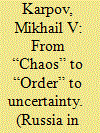| Srl | Item |
| 1 |
ID:
170598


|
|
|
|
|
| Summary/Abstract |
The article describes how social and political changes in post-Soviet Russia over the past quarter of a century have been read and assessed by Chinese experts in relevant fundamental monographs. Each of the monographs considered herein, published in China twelve years apart, reviews different stages in the evolution of Chinese experts’ approach towards Russia, and states their analytical, ideological and political conclusions. Generally speaking, China’s sociopolitical Russian studies have evolved from the ideologically motivated resentment against the Soviet Union’s dissolution, the disbandment of its Communist Party and the ensuing shock reforms of the 1990s to the recognition of irreversible changes in Russia and “legitimization” of the Russian leadership in the 2000s-2010s. However, by the end of the current decade, the topic of uncertainty about Russia’s future sociopolitical and economic development has once again surfaced in some key publications along with increasingly “panegyrical” assessments of the Russian president.
|
|
|
|
|
|
|
|
|
|
|
|
|
|
|
|
| 2 |
ID:
142925


|
|
|
|
|
| Summary/Abstract |
Oil anxieties usually stem from fears about running out of oil, but the true oil scourge of the past is overabundance. Oilmen conceal their oil in order to maintain profits and manipulate their monopoly on oil so that they may wield political power. To keep the price of oil high enough to sustain the industry, oil authorities have developed methods of producing scarcity. The results of making oil scarce have been harmful to society economically, politically, and socioculturally. Since current forms of alternative energy are naturally scarce, this article evaluates whether the effects of the oil curse arise from scarcity itself or from the production of scarcity. The destructive experiences with produced oil scarcity inform prospects for a future with alternative energy, including how these energy forms can be developed in ways that avoid the associated effects of the "oil curse."
|
|
|
|
|
|
|
|
|
|
|
|
|
|
|
|